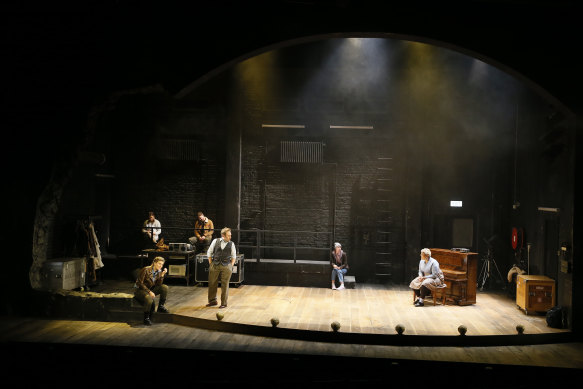None of which is to deny the ensemble creates lively and diverting moments, from jaunty chorus numbers to the silly ventriloquism of Cyrano wooing on behalf of Claude Jabbour’s ultimate himbo, although you’ll have to wade through dick jokes, and other forlorn attempts at wit, to get to them.
Perhaps the greatest missed opportunity is the reinvention of Roxanne (Tuuli Narkle) – herself a poet, objectified by her appearance. A melodramatic take that views Cyrano’s deception as catfishing just adds to the oddball sitcom flavour of the piece, and the dreamy romantic finale doesn’t quite rise to the occasion.

A scene from Cyrano at Melbourne Theatre Company.Credit:Jeff Busby
It’s a shame, too, for anyone (myself included) who would leap at the chance to see Gay perform any of Rostand’s sweeping speeches in the plainest translation. Where is the queer Cyrano who defends her right to be all three Musketeers rolled into one?
“To sing, to laugh, to dream,
To walk in my own way and be alone,
Free, with an eye to see things as they are
…
Never to make a line I have not heard
In my own heart; yet, with all modesty
To say, “My soul, be satisfied with flowers,
With fruit, with weeds even; but gather them
In the one garden you may call your own.”
There’s barely a pale shade of her, alas.
Cyrano’s refinement, passion, eloquence, and wit, all the ornaments of intellectual and artistic life are obscured by pandering to a culture hostile to them.
It’s worth asking why this production assumes theatrical ignorance in its audience. Or how a character can blithely dismiss poetry as “draining” without riposte. Or indeed what drove Gay to resort to so much low-hanging comedic fruit, when Cyrano spurns the idea of using language to “be a buffoon/ in the vile hope of teasing out a smile/ on some cold face.”
That reduced goal is, in the end, what this Cyrano settles for. It should tickle anyone who just wants to switch their brain off and have a good time, yet the adaptation is unlikely to satisfy those familiar with the original.
Reviewed by Cameron Woodhead
DANCE
Meremere ★★★★½
Arts Centre Melbourne, until 01 October
When Rodney Bell (Ngāti Maniapoto) returned home to Aotearoa after living rough in San Francisco, he carved a Meremere, a Maori weapon out of wood, and reflected on culture.

Rodney Bell (Ngāti Maniapoto) performs in Meremere.Credit:Kate Disher-Quill
Bell dances in a wheelchair and Meremere, his biographical show, offers an uplifting glimpse of the pulls between family, career and disability.
Dance, both in the chair (Bell’s “girlfriend”) and alongside it, is only one piece of complex yet accessible storytelling peppered with grit and humility.
On a white, triangular stage, Rowan Pierce’s projections literally extend Bell’s arms or, at other times, move in response to his physical directions.
The visual integration allows for a richly textured work and only enhances, never detracts, from Bell’s material. At one point, Bell positions himself onto a projection of beds in a homeless shelter, shifting from one to another, trying to secure a spot. Later, San Francisco street facades and maps loom large around him.
When Bell dances – his arms wrapping around his bare torso, slapping a microphone on his chest in body percussion or showing off wheelchair tricks – it’s easy to see why he won the prestigious Isadora Duncan Dance Award.

Rodney Bell (Ngāti Maniapoto) and Brydie Colquhoun in Meremere.Credit:Kate Disher-Quill
His physicality is fierce, but vulnerable, especially so when guest dancer Brydie Colquhoun emerges from the audience to duet with him. She balances atop his back, manipulates his chair into spiralling turns and locks eyes in intense stares. Projections of the same duet performed in earlier years highlight Bell’s prolific career in mixed ability dance companies.
Musician Jol Mulholland is side stage for the entire journey, dishing up a mix of guitar, vocals and electronica and very much part of the production.
Loading
Meremere’s tight collaboration (directed by Malia Johnston) elevates it to a solo that is more than the sum of its parts. With great yarns to tell and coming from the heart, it’s not sugar coated or preachy, just honest.
Reviewed by Stephanie Glickman
A cultural guide to going out and loving your city. Sign up to our Culture Fix newsletter here.








